

Overfishing WWF. Fishing is one of the most significant drivers of declines in ocean wildlife populations.
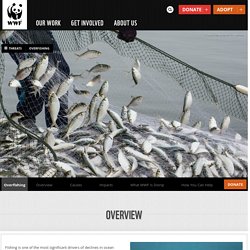
Catching fish is not inherently bad for the ocean, except for when vessels catch fish faster than stocks can replenish, something called overfishing. The number of overfished stocks globally has tripled in half a century and today fully one-third of the world's assessed fisheries are currently pushed beyond their biological limits, according to the Food and Agriculture Organization of the United Nations. Overfishing is closely tied to bycatch—the capture of unwanted sea life while fishing for a different species. This, too, is a serious marine threat that causes the needless loss of billions of fish, along with hundreds of thousands of sea turtles and cetaceans. The damage done by overfishing goes beyond the marine environment. Many people who make a living catching, selling, and buying fish are working to improve how the world manages and conserves ocean resources. Illegal fishing off Africa’s coast must be stopped, Caroline Kende-Robb writes in the Guardian – Africa Progress Panel.
The livelihoods and nutrition of millions of people in Africa are being put at risk by foreign fishing fleets in their waters.

Illegal fishing was a threat to Africa‘s coastal communities even 25 years ago, when I lived and worked in Tanji, a fishing village on the Gambian coast. If you got up before sunrise, you could see groups of six or seven young men sailing out towards the Atlantic Ocean in their precarious wooden pirogues. I worked with the fishermen as part of a European project. They told me how foreign trawlers were creeping closer to the shore, catching their fish and mangling their fragile nets. With their catches declining dramatically, the fishermen were forced to sail further and further out. One day, the pirogues did not return.
A quarter of a century later, west Africa suffers proportionally more from illegal fishing than any other region of the world. Rising global demand for fish has made African waters a magnet for fleets from around the world. Photo credit: Greenpeace. 10 Alarming Facts About Overfishing. We humans seem to have an appetite for destruction, and we are consuming our planet’s resources at an alarming rate.
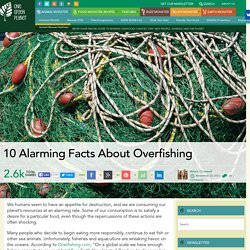
Some of our consumption is to satisfy a desire for a particular food, even though the repercussions of these actions are often shocking. Many people who decide to begin eating more responsibly, continue to eat fish or other sea animals. Unfortunately, fisheries and aquaculture are wreaking havoc on the oceans. According to Overfishing.com, “On a global scale we have enough fishing capacity to cover at least four Earth like planets.” Read on to discover ten alarming facts about overfishing and spread the word!
1. Modern fishing ships use technologically advanced fish-finding sonar that can find a school of fish with almost military precision. 2. In just 55 years, humans have managed to wipe out 90 percent of the ocean’s top predators. 3. After depleting the most valuable fish, the apex predators and large fish like bluefin tuna, the next step is moving down the food chain. Overfishing. "There's enough on this planet for everyone's needs but not for everyone's greed" - Mahatma Gandhi For our children to have future income, food and pleasure we need healthy oceans and a healthy fishing industry.
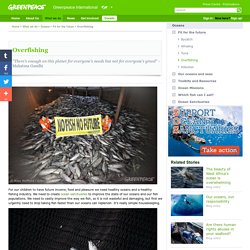
We need to create ocean sanctuaries to improve the state of our oceans and our fish populations. We need to vastly improve the way we fish, so it is not wasteful and damaging, but first we urgently need to stop taking fish faster than our oceans can replenish. It’s really simple housekeeping. National Geographic. Ocean overfishing is simply the taking of wildlife from the sea at rates too high for fished species to replace themselves.
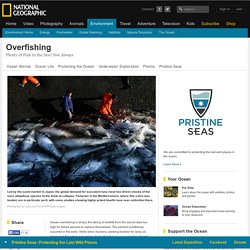
The earliest overfishing occurred in the early 1800s when humans, seeking blubber for lamp oil, decimated the whale population. Some fish that we eat, including Atlantic cod and herring and California's sardines, were also harvested to the brink of extinction by the mid-1900s. Over fishing the bluefin tuna. What are the impacts of overfishing. Impact of overfishing It is very easy to predict the most obvious impact of overfishing — no more fish for humans!
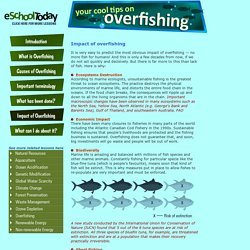
And this is only a few decades from now, if we do not act quickly and decisively. But there is far more to this than lack of fish. Here is why: Save Our Seas Foundation. One in five people on this planet depends on fish as the primary source of protein.
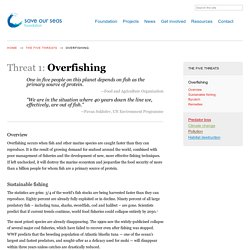
—Food and Agriculture Organization "We are in the situation where 40 years down the line we, effectively, are out of fish. " —Pavan Sukhdev, UN Environment Programme Overview Overfishing occurs when fish and other marine species are caught faster than they can reproduce. Sustainable fishing The statistics are grim: 3/4 of the world's fish stocks are being harvested faster than they can reproduce. The most prized species are already disappearing. Case study: Atlantic bluefin tuna They can weigh over half a ton, grow to over four metres in length, and dive to depths of 1,000 metres. Bluefin tuna are unique, perfectly-adapted products of evolution. Coveted for their dense, dark red meat used in sushi (where it is known as “toro”), bluefin support an unsustainable $7.2 billion industry that has driven tuna stocks to the brink of collapse. Bycatch Remedies What can be done? In practical terms, this means: